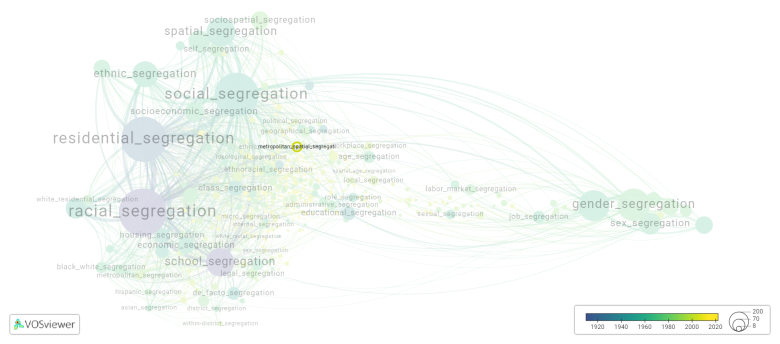Metropolitan spatial segregation: Difference between revisions
(Creating page) |
(Creating page) |
||
| (5 intermediate revisions by the same user not shown) | |||
| Line 10: | Line 10: | ||
Efforts to address metropolitan spatial segregation typically involve policies and initiatives aimed at promoting more diverse and inclusive communities. This may include affordable housing programs, fair housing laws, investment in public transportation and infrastructure, and efforts to combat discrimination and promote social integration. By addressing spatial segregation, cities can work towards creating more equitable and vibrant metropolitan areas that offer opportunities for all residents to thrive. | Efforts to address metropolitan spatial segregation typically involve policies and initiatives aimed at promoting more diverse and inclusive communities. This may include affordable housing programs, fair housing laws, investment in public transportation and infrastructure, and efforts to combat discrimination and promote social integration. By addressing spatial segregation, cities can work towards creating more equitable and vibrant metropolitan areas that offer opportunities for all residents to thrive. | ||
==See also== | ==See also== | ||
==Related segregation forms== | |||
Metropolitan spatial segregation is frequently discussed in the literature with the following segregation forms: | |||
[[urban segregation]], [[spatial segregation]], [[spatial socioeconomic segregation]] | |||
[[File:metropolitan_spatial_segregation.png|780x780px]] | |||
This visualization is based on the study [[Segregation_Wiki:About| The Multidisciplinary Landscape of Segregation Research]]. | |||
For the complete network of interrelated segregation forms, please refer to: | |||
* [https://tinyurl.com/2235lkhw First year of publication] | |||
* [https://tinyurl.com/2d8wg5n3 Louvain clusters] | |||
* [https://tinyurl.com/223udk5r Betweenness centrality] | |||
* [https://tinyurl.com/244d8unz Disciplines in which segregation forms first emerged (Scopus database).] | |||
==References== | ==References== | ||
==Notes== | ==Notes== | ||
<references /> | <references /> | ||
{{NoteAI}} | {{NoteAI}} | ||
==Metropolitan | ==Metropolitan spatial segregation appears in the following literature== | ||
Thibert J., Osorio G.A. (2014). Urban segregation and metropolitics in latin America: The Case of Bogotá, Colombia. ''International Journal of Urban and Regional Research'', ''38''(4), 1319-1343. Blackwell Publishing Ltd.https://doi.org/10.1111/1468-2427.12021 | Thibert J., Osorio G.A. (2014). Urban segregation and metropolitics in latin America: The Case of Bogotá, Colombia. ''International Journal of Urban and Regional Research'', ''38''(4), 1319-1343. Blackwell Publishing Ltd.https://doi.org/10.1111/1468-2427.12021 | ||
Latest revision as of 07:17, 16 October 2024
Date and country of first publication[1][edit | edit source]
2014
United States
Definition[edit | edit source]
Metropolitan spatial segregation refers to the physical separation of different groups of people within a metropolitan area based on various factors such as race, ethnicity, income, and social class. This segregation can occur through residential patterns, where certain neighborhoods or areas become predominantly inhabited by one particular group. It can also manifest in the form of exclusionary zoning laws, discriminatory lending practices, and other institutional factors that perpetuate the division of communities along social lines.
Metropolitan spatial segregation can have significant impacts on the quality of life and opportunities available to different groups within a city. It can contribute to disparities in access to resources such as good schools, healthcare, public services, and job opportunities. Additionally, spatial segregation can reinforce social inequalities and perpetuate cycles of poverty and marginalization.
Efforts to address metropolitan spatial segregation typically involve policies and initiatives aimed at promoting more diverse and inclusive communities. This may include affordable housing programs, fair housing laws, investment in public transportation and infrastructure, and efforts to combat discrimination and promote social integration. By addressing spatial segregation, cities can work towards creating more equitable and vibrant metropolitan areas that offer opportunities for all residents to thrive.
See also[edit | edit source]
Related segregation forms[edit | edit source]
Metropolitan spatial segregation is frequently discussed in the literature with the following segregation forms:
urban segregation, spatial segregation, spatial socioeconomic segregation

This visualization is based on the study The Multidisciplinary Landscape of Segregation Research.
For the complete network of interrelated segregation forms, please refer to:
References[edit | edit source]
Notes[edit | edit source]
- ↑ Date and country of first publication as informed by the Scopus database (December 2023).
At its current state, this definition has been generated by a Large Language Model (LLM) so far without review by an independent researcher or a member of the curating team of segregation experts that keep the Segregation Wiki online. While we strive for accuracy, we cannot guarantee its reliability, completeness and timeliness. Please use this content with caution and verify information as needed. Also, feel free to improve on the definition as you see fit, including the use of references and other informational resources. We value your input in enhancing the quality and accuracy of the definitions of segregation forms collectively offered in the Segregation Wiki ©.
Metropolitan spatial segregation appears in the following literature[edit | edit source]
Thibert J., Osorio G.A. (2014). Urban segregation and metropolitics in latin America: The Case of Bogotá, Colombia. International Journal of Urban and Regional Research, 38(4), 1319-1343. Blackwell Publishing Ltd.https://doi.org/10.1111/1468-2427.12021
